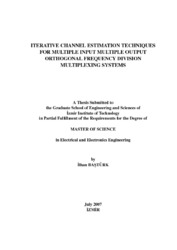Please use this identifier to cite or link to this item:
https://hdl.handle.net/11147/3637Full metadata record
| DC Field | Value | Language |
|---|---|---|
| dc.contributor.advisor | Özbek, Berna | en |
| dc.contributor.author | Baştürk, İlhan | - |
| dc.date.accessioned | 2014-07-22T13:52:00Z | - |
| dc.date.available | 2014-07-22T13:52:00Z | - |
| dc.date.issued | 2007 | en |
| dc.identifier.uri | http://hdl.handle.net/11147/3637 | - |
| dc.description | Thesis (Master)--Izmir Institute of Technology, Electronics and Communication Engineering, Izmir, 2007 | en |
| dc.description | Includes bibliographical references (leaves: 77-78) | en |
| dc.description | Text in English; Abstract: Turkish and English | en |
| dc.description | xii, 78 leaves | en |
| dc.description.abstract | Orthogonal frequency division multiplexing (OFDM) is well-known for its efficient high speed transmission and robustness to frequency-selective fading channels. On the other hand, multiple-input multiple-output (MIMO) antenna systems have the ability to increase capacity and reliability of a wireless communication system compared to single-input single-output (SISO) systems. Hence, the integration of the two technologies has the potential to meet the ever growing demands of future communication systems. In these systems, channel estimation is very crucial to demodulate the data coherently. For a good channel estimation, spectral efficiency and lower computational complexity are two important points to be considered. In this thesis, we explore different channel estimation techniques in order to improve estimation performance by increasing the bandwidth efficiency and reducing the computational complexity for both SISO-OFDM and MIMO-OFDM systems. We first investigate pilot and Expectation-Maximization (EM)-based channel estimation techniques and compare their performances. Next, we explore different pilot arrangements by reducing the number of pilot symbols in one OFDM frame to improve bandwidth efficiency. We obtain the bit error rate and the channel estimation performance for these pilot arrangements. Then, in order to decrase the computational complexity, we propose an iterative channel estimation technique, which establishes a link between the decision block and channel estimation block using virtual subcarriers. We compare this proposed technique with EM-based channel estimation in terms of performance and complexity. These channel estimation techniques are also applied to STBC-OFDM and V-BLAST structured MIMO-OFDM systems. Finally, we investigate a joint EM-based channel estimation and signal detection technique for V-BLAST OFDM system. | en |
| dc.language.iso | en | en_US |
| dc.publisher | Izmir Institute of Technology | en |
| dc.rights | info:eu-repo/semantics/openAccess | en_US |
| dc.subject.lcc | TK5103.484 B32 2007 | en |
| dc.subject.lcsh | Orthogonal frequency division multiplexing | en |
| dc.subject.lcsh | MIMO systems | en |
| dc.title | Iterative channel estimation techniques for multiple input multiple output orthogonal frequency division multiplexing systems | en_US |
| dc.type | Master Thesis | en_US |
| dc.institutionauthor | Baştürk, İlhan | - |
| dc.department | Thesis (Master)--İzmir Institute of Technology, Electrical and Electronics Engineering | en_US |
| dc.relation.publicationcategory | Tez | en_US |
| item.languageiso639-1 | en | - |
| item.fulltext | With Fulltext | - |
| item.openairecristype | http://purl.org/coar/resource_type/c_18cf | - |
| item.openairetype | Master Thesis | - |
| item.grantfulltext | open | - |
| item.cerifentitytype | Publications | - |
| Appears in Collections: | Master Degree / Yüksek Lisans Tezleri | |
Files in This Item:
| File | Description | Size | Format | |
|---|---|---|---|---|
| T000653.pdf | MasterThesis | 986.16 kB | Adobe PDF |  View/Open |
CORE Recommender
Page view(s)
56
checked on Jul 22, 2024
Download(s)
56
checked on Jul 22, 2024
Google ScholarTM
Check
Items in GCRIS Repository are protected by copyright, with all rights reserved, unless otherwise indicated.